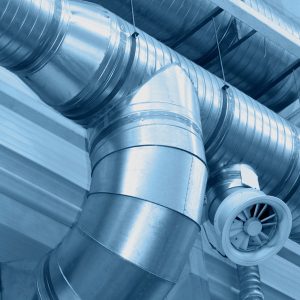
System of ventilating pipes
We recently discussed the problems of high humidity in buildings. In this post, we wish to talk more in depth about how we take a holistic approach to creating balancing humidity. A key part of this approach is managing humidity levels inside buildings through proper ventilation, air balancing, and dehumidification. As anyone who has gone through a single summer in Toronto knows, high humidity is a major problem—and it easily gets into buildings where it can cause significant damage beyond simply making a space less comfortable.
The standard measure of high humidity is relative humidity that’s greater than 60%. (Relative humidity is a measure of water vapor in the air relative to the temperature of the air, i.e. the percentage of water vapor in the air of the total amount that could be held at the current temperature.) Residential homes usually aim to balance humidity at 45%. But when it comes to commercial and industrial spaces the ideal humidity balance may be different based on equipment and process. This is one of the main reasons to work with professionals to combat humidity in your facility: our experts will know what humidity level is ideal for the space.

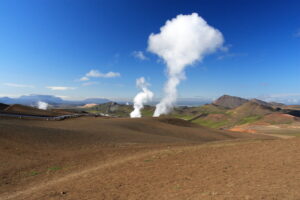 Geothermal energy offers special advantages for heating and cooling commercial facilities. These systems remove boilers and cooling towers from the conventional HVAC set-up for a building and instead use the thermal energy of the earth—a renewable resource and one that allows for high levels of energy efficiency.
Geothermal energy offers special advantages for heating and cooling commercial facilities. These systems remove boilers and cooling towers from the conventional HVAC set-up for a building and instead use the thermal energy of the earth—a renewable resource and one that allows for high levels of energy efficiency.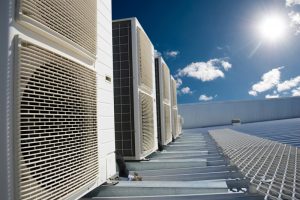 If your facility is like most modern ones, it uses packaged rooftop AC units to provide it with cooling. For a small retail business, you might only need a single unit to meet your needs. Larger companies may use many of these modular units to deliver the proper climate control within the building.
If your facility is like most modern ones, it uses packaged rooftop AC units to provide it with cooling. For a small retail business, you might only need a single unit to meet your needs. Larger companies may use many of these modular units to deliver the proper climate control within the building. 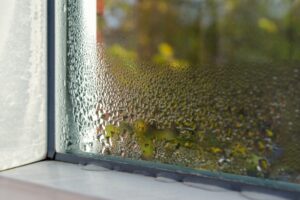 Relative humidity during the summers in Toronto is often extreme. The July daily average is 82% relative humidity, which is 22% higher than what’s already considered high humidity. The increase in moisture in the air is a cause of discomfort on hot days, but high humidity is also a major concern for commercial buildings. Not only do commercial facilities need to worry about comfort levels indoors, they also have concerns about the damage high moisture levels can do to equipment and property and how it can affect process.
Relative humidity during the summers in Toronto is often extreme. The July daily average is 82% relative humidity, which is 22% higher than what’s already considered high humidity. The increase in moisture in the air is a cause of discomfort on hot days, but high humidity is also a major concern for commercial buildings. Not only do commercial facilities need to worry about comfort levels indoors, they also have concerns about the damage high moisture levels can do to equipment and property and how it can affect process.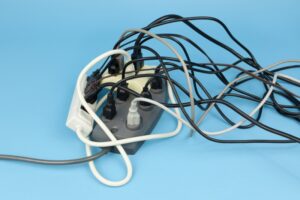
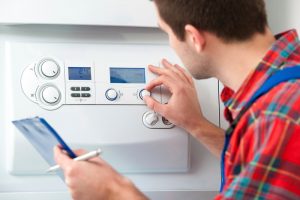 Building Automation Systems (BAS) are both the present and the future of energy management for commercial and industrial facilities. Using building automation gives you new tools for handling different systems in your facility, including heating, cooling, ventilation, security, and electrical systems. The increasing complexity of these systems makes it necessary to have automation to oversee them effectively. Customized
Building Automation Systems (BAS) are both the present and the future of energy management for commercial and industrial facilities. Using building automation gives you new tools for handling different systems in your facility, including heating, cooling, ventilation, security, and electrical systems. The increasing complexity of these systems makes it necessary to have automation to oversee them effectively. Customized 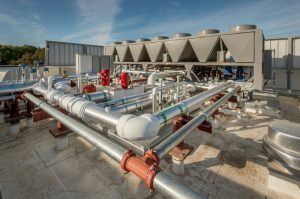 What is the best thing you can have done for your
What is the best thing you can have done for your  Negative air pressure inside a building creates problems for both homes and commercial/industrial facilities. The simple description of negative air pressure is that it is when the air pressure inside a building is lower than the air pressure outside it.
Negative air pressure inside a building creates problems for both homes and commercial/industrial facilities. The simple description of negative air pressure is that it is when the air pressure inside a building is lower than the air pressure outside it. 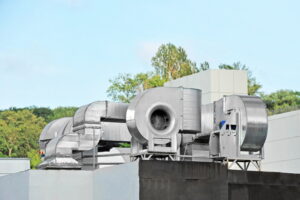 Residential homes have standard maintenance program calendars: maintenance for the air conditioner in spring and for the heater in fall. It’s not so cut-and-dried for industrial facilities where cooling and heating systems often work year-round and handle more jobs than simply providing indoor comfort for customers and employees. The heating systems in an industrial facility serve numerous functions and must operate during all seasons, making their regular maintenance essential in periods when everyone else is scheduling service for their air conditioning systems.
Residential homes have standard maintenance program calendars: maintenance for the air conditioner in spring and for the heater in fall. It’s not so cut-and-dried for industrial facilities where cooling and heating systems often work year-round and handle more jobs than simply providing indoor comfort for customers and employees. The heating systems in an industrial facility serve numerous functions and must operate during all seasons, making their regular maintenance essential in periods when everyone else is scheduling service for their air conditioning systems.